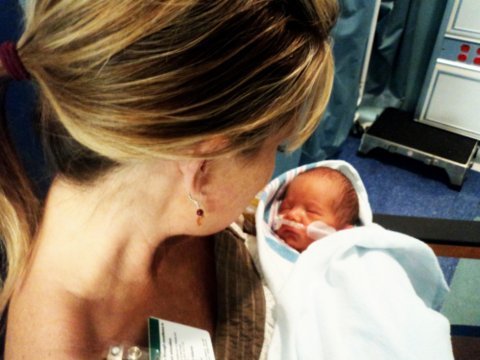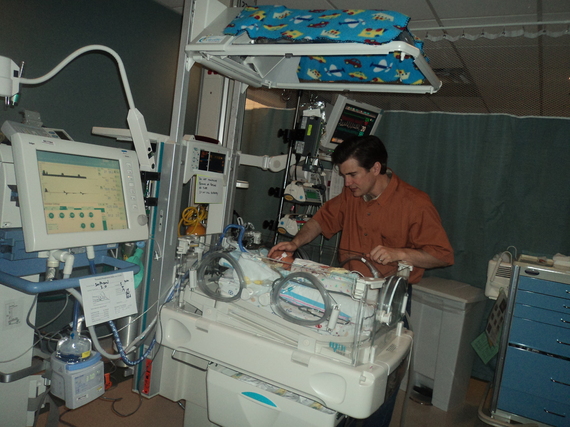You want to help. Your friend just admitted her child to the hospital, and it's serious. You don't know what to do, but you want to do something.
As the mother of a medically fragile child, I want to pass along some hints from my own experience -- those things that helped us through the scariest days. I hope this helps those who need TLC from you today.

15 Dos and Don'ts for Helping a Friend With a Child in the Hospital
1. DON'T stop calling because you feel like you're bothering them.
DO check in and let them know you are here.
We pull back because we "don't want to bother" someone who is struggling. Let me debunk that myth: Your friend needs to hear from you. If you stop connecting, that communicates that their situation is unimportant. They will remember.
2. DON'T forget the diagnosis.
DO ask questions, remember the major issues and look them up.
Ask for the spelling of the diagnosis and care enough to be informed. You don't have to speak the medical language, but by understanding their child's issues, you will give a tremendous gift. And if you have questions -- ask. That shows you care.
3. DON'T forget a major surgery or test.
DO mark your calendar and send a message of support.
Someone remembering means the world. They will be blessed by your words, even if they don't have time to respond. This is especially true as they sit in the O.R. waiting room... waiting...
4. DON'T ignore them because you are scared they might cry.
DO have the courage to check in, even if it means you might hear emotion on the other end.
Our culture is afraid of tears. Please don't be. Just say, "I am so sorry that you are going through this. I care about you and your little one so much. I am here." Then be there.
5. DON'T forget that they are in the hospital when you are celebrating holidays.
DO recognize that they need love on special days.
While they don't want you to miss time with your family, they would treasure being remembered by a phone call, handmade card or video chat with everyone standing around a sign that says "We love you!"
6. DON'T believe that they "really don't need anything."
DO drop off a meal, clean or offer to take their kids. And you can always, always give the gift of prayer.
The majority of people have a very hard time asking for what they need, and knowing that they have food, a clean house or prayers lifted can get them through the day.
7. DON'T overstay your welcome by insisting on a sit-down visit.
DO bring food or supplies over, understanding that they don't have the energy to entertain you, unless they are clear that they need to talk. Then stay, help and listen.
Their schedule revolves around the hospital, family, sleeping and meals, so stay aware that they have a lot to get done while they are home. If your friend insists that having you there is comforting, stay and help.
8. DON'T get your feelings hurt if they cannot answer the phone.
DO know that they need to reserve their energy.
Understand that this does not reflect how much they love you. They are just doing their best to stay afloat on very little sleep and zero free time.

9. DON'T forget to respond to emails/texts/posts.
DO send a response to their messages saying something supportive. They are checking, because they need it.
While they may not have the time for one-on-one conversations, they will find great comfort in the middle of the night as they lie awake in the hospital checking messages -- reminding them that they are not alone (because they feel like it).
10. DON'T simplify or dismiss their child's medical condition by saying, "Everything happens for a reason." Please.
DO validate the seriousness of the illness by confirming that they are facing something very difficult.
Speak words of care and hope. Talk about the preciousness of the child and your love for them. Don't dismiss the crisis. Say, "I am heartbroken you and your baby are going through this. Hang in there and know there are so many people who care about you."
11. DON'T act like you can relate to the seriousness of the medical complication unless you have been through the same thing.
DO acknowledge that you are trying to understand it.
Do not try to trump their story with one of your own. If you can relate, offer to walk alongside them.
12. DON'T tell them all of the details of your week at the beach while they are in the hospital.
DO encourage them to do something "normal" if their child stabilizes. Offer childcare or a group date when they need it.
Remember, they haven't felt "normal" for a while -- and they miss it.
13. DON'T show up with junk food.
DO care enough about them to bring healthy munchies. DO take a stroll around the hospital with them.
Since their self-care is suffering, healthy food and movement will help their bodies. Bring homemade vegetables, a tray of sandwiches or cut-up fruit. Help them air out their tired souls with a walk in the hospital's garden.
14. DON'T forget to wash your hands or to stay away if you are sick.
DO wash your hands when you walk in the room, and only walk in with perfect health.
Understand that a virus on your hands can mean a catastrophic infection for their child.
15. DON'T forget to ask the parents how they are doing.
DO ask "How are you?" Then wait for the truth after they say, "I'm fine."
People often forget to check in on the parents. They are struggling with exhaustion, confusion and fear. Be there for them by being present to their struggle. Just listen -- they know you cannot fix things. They just need love.
from Healthy Living - The Huffington Post http://www.huffingtonpost.com/dr-karin-l-smithson/conscious-relationships_b_4350876.html?utm_hp_ref=healthy-living&ir=Healthy+Living
via IFTTT
As the mother of a medically fragile child, I want to pass along some hints from my own experience -- those things that helped us through the scariest days. I hope this helps those who need TLC from you today.

15 Dos and Don'ts for Helping a Friend With a Child in the Hospital
1. DON'T stop calling because you feel like you're bothering them.
DO check in and let them know you are here.
We pull back because we "don't want to bother" someone who is struggling. Let me debunk that myth: Your friend needs to hear from you. If you stop connecting, that communicates that their situation is unimportant. They will remember.
2. DON'T forget the diagnosis.
DO ask questions, remember the major issues and look them up.
Ask for the spelling of the diagnosis and care enough to be informed. You don't have to speak the medical language, but by understanding their child's issues, you will give a tremendous gift. And if you have questions -- ask. That shows you care.
3. DON'T forget a major surgery or test.
DO mark your calendar and send a message of support.
Someone remembering means the world. They will be blessed by your words, even if they don't have time to respond. This is especially true as they sit in the O.R. waiting room... waiting...
4. DON'T ignore them because you are scared they might cry.
DO have the courage to check in, even if it means you might hear emotion on the other end.
Our culture is afraid of tears. Please don't be. Just say, "I am so sorry that you are going through this. I care about you and your little one so much. I am here." Then be there.
5. DON'T forget that they are in the hospital when you are celebrating holidays.
DO recognize that they need love on special days.
While they don't want you to miss time with your family, they would treasure being remembered by a phone call, handmade card or video chat with everyone standing around a sign that says "We love you!"
6. DON'T believe that they "really don't need anything."
DO drop off a meal, clean or offer to take their kids. And you can always, always give the gift of prayer.
The majority of people have a very hard time asking for what they need, and knowing that they have food, a clean house or prayers lifted can get them through the day.
7. DON'T overstay your welcome by insisting on a sit-down visit.
DO bring food or supplies over, understanding that they don't have the energy to entertain you, unless they are clear that they need to talk. Then stay, help and listen.
Their schedule revolves around the hospital, family, sleeping and meals, so stay aware that they have a lot to get done while they are home. If your friend insists that having you there is comforting, stay and help.
8. DON'T get your feelings hurt if they cannot answer the phone.
DO know that they need to reserve their energy.
Understand that this does not reflect how much they love you. They are just doing their best to stay afloat on very little sleep and zero free time.

9. DON'T forget to respond to emails/texts/posts.
DO send a response to their messages saying something supportive. They are checking, because they need it.
While they may not have the time for one-on-one conversations, they will find great comfort in the middle of the night as they lie awake in the hospital checking messages -- reminding them that they are not alone (because they feel like it).
10. DON'T simplify or dismiss their child's medical condition by saying, "Everything happens for a reason." Please.
DO validate the seriousness of the illness by confirming that they are facing something very difficult.
Speak words of care and hope. Talk about the preciousness of the child and your love for them. Don't dismiss the crisis. Say, "I am heartbroken you and your baby are going through this. Hang in there and know there are so many people who care about you."
11. DON'T act like you can relate to the seriousness of the medical complication unless you have been through the same thing.
DO acknowledge that you are trying to understand it.
Do not try to trump their story with one of your own. If you can relate, offer to walk alongside them.
12. DON'T tell them all of the details of your week at the beach while they are in the hospital.
DO encourage them to do something "normal" if their child stabilizes. Offer childcare or a group date when they need it.
Remember, they haven't felt "normal" for a while -- and they miss it.
13. DON'T show up with junk food.
DO care enough about them to bring healthy munchies. DO take a stroll around the hospital with them.
Since their self-care is suffering, healthy food and movement will help their bodies. Bring homemade vegetables, a tray of sandwiches or cut-up fruit. Help them air out their tired souls with a walk in the hospital's garden.
14. DON'T forget to wash your hands or to stay away if you are sick.
DO wash your hands when you walk in the room, and only walk in with perfect health.
Understand that a virus on your hands can mean a catastrophic infection for their child.
15. DON'T forget to ask the parents how they are doing.
DO ask "How are you?" Then wait for the truth after they say, "I'm fine."
People often forget to check in on the parents. They are struggling with exhaustion, confusion and fear. Be there for them by being present to their struggle. Just listen -- they know you cannot fix things. They just need love.
from Healthy Living - The Huffington Post http://www.huffingtonpost.com/dr-karin-l-smithson/conscious-relationships_b_4350876.html?utm_hp_ref=healthy-living&ir=Healthy+Living
via IFTTT
No comments:
Post a Comment